Symptom Finder - Failure to Thrive
FAILURE TO THRIVE
Failure to thrive is germane to the pediatric patient who is not growing adequately or fails to gain weight and appears emaciated. The physiologic model of intake, absorption, transport, and utilization will help develop a differential diagnosis.
Intake: Intake of food may be impaired by social conditions of poverty, malnutrition, and child abuse. It may also be impaired by chronic anxiety and depression or other psychiatric disorders. Finally, the patient may not eat because of a neurologic disorder such as microcephaly, hydrocephalus, cerebral palsy, or other disorders associated with mental retardation.
Absorption: Absorption of food may be impaired by malabsorption syndrome and fibrocystic disease.
Transport: This topic brings to mind chronic anemia and congenital heart disease especially when associated with hypoxemia.
Utilization: Utilization of food is impaired in diabetes mellitus, hypothyroidism, pituitary insufficiency, galactosemia, and uremia.
Several chronic infectious diseases are associated with failure to thrive. The child may also come from an abnormal gestation where the mother suffered alcoholism, drug abuse, or chronic illness.
Approach to the Diagnosis
Routine diagnostic workup should include a CBC, sedimentation rate, urinalysis, urine culture, chemistry panel, sweat test, stool for quantitative fat, chest x-ray, and electrocardiogram (ECG). Bone age x-rays are helpful in determining growth retardation. At this point, it is helpful to consult a pediatrician before ordering expensive diagnostic tests. When studies are negative, consider constitutional growth delay as the cause.
Other Useful Tests
1. D-xylose absorption test (malabsorption syndrome)
2. Stool for ova and parasites (intestinal parasites)
3. Serum growth hormone (pituitary insufficiency)
4. Somatomedin-C level (pituitary insufficiency)
5. Overnight dexamethasone suppression test (adrenogenital
syndrome)
6. Thyroid profile (myxedema)
7. CT scan of the brain (hydrocephalus, etc.)
8. MRI of the brain (hydrocephalus)
9. Neurology consult
10. Orthopedic consult
11. Endocrinology consult
12. Buccal smear for Barr bodies (Turner syndrome)
13. Karyotyping (Turner syndrome)
Failure to thrive is germane to the pediatric patient who is not growing adequately or fails to gain weight and appears emaciated. The physiologic model of intake, absorption, transport, and utilization will help develop a differential diagnosis.
Intake: Intake of food may be impaired by social conditions of poverty, malnutrition, and child abuse. It may also be impaired by chronic anxiety and depression or other psychiatric disorders. Finally, the patient may not eat because of a neurologic disorder such as microcephaly, hydrocephalus, cerebral palsy, or other disorders associated with mental retardation.
Absorption: Absorption of food may be impaired by malabsorption syndrome and fibrocystic disease.
Transport: This topic brings to mind chronic anemia and congenital heart disease especially when associated with hypoxemia.
Utilization: Utilization of food is impaired in diabetes mellitus, hypothyroidism, pituitary insufficiency, galactosemia, and uremia.
Several chronic infectious diseases are associated with failure to thrive. The child may also come from an abnormal gestation where the mother suffered alcoholism, drug abuse, or chronic illness.
Approach to the Diagnosis
Routine diagnostic workup should include a CBC, sedimentation rate, urinalysis, urine culture, chemistry panel, sweat test, stool for quantitative fat, chest x-ray, and electrocardiogram (ECG). Bone age x-rays are helpful in determining growth retardation. At this point, it is helpful to consult a pediatrician before ordering expensive diagnostic tests. When studies are negative, consider constitutional growth delay as the cause.
Other Useful Tests
1. D-xylose absorption test (malabsorption syndrome)
2. Stool for ova and parasites (intestinal parasites)
3. Serum growth hormone (pituitary insufficiency)
4. Somatomedin-C level (pituitary insufficiency)
5. Overnight dexamethasone suppression test (adrenogenital
syndrome)
6. Thyroid profile (myxedema)
7. CT scan of the brain (hydrocephalus, etc.)
8. MRI of the brain (hydrocephalus)
9. Neurology consult
10. Orthopedic consult
11. Endocrinology consult
12. Buccal smear for Barr bodies (Turner syndrome)
13. Karyotyping (Turner syndrome)

